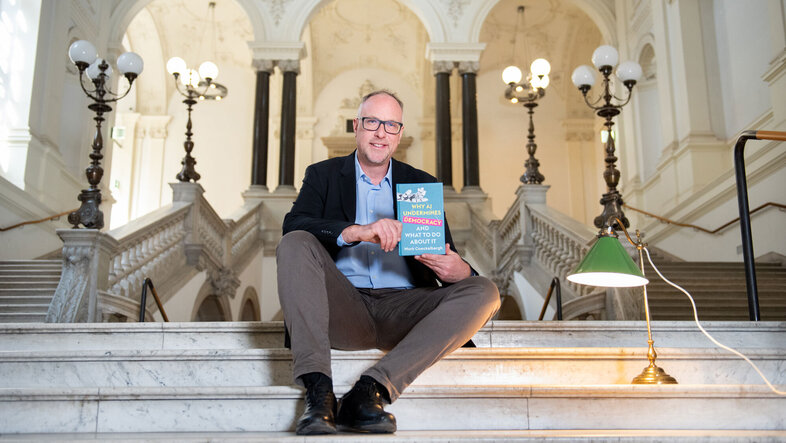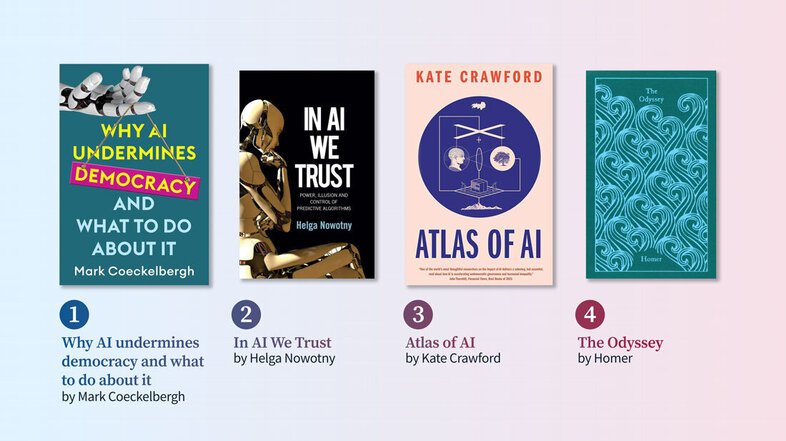"Why AI Undermines Democracy" by Mark Coeckelbergh
Rudolphina: Professor Coeckelbergh, what is your book about and why did you write it?
Mark Coeckelbergh:
It is about the relationship between democracy and artificial intelligence. I came to this because I have been working on the politics of AI for a while, bridging philosophical and political ideas to think about problems regarding this emerging technology. This work culminated in the book The Political Philosophy of AI, and I then decided to focus on democracy.
It worries me that we are seeing more and more tendencies towards authoritarianism – or at least a weakening of democracy – in the world, including Europe. So I sat down and asked myself: What kind of impact does AI have on democracy? The first half of the book argues why AI has the potential to undermine democracy. In the second half I reflect on solutions: How can AI even support, instead of undermine, democracy? What would we need for this?
Join the event "Empowering Citizens: Media Literacy & Democracy"
U.S.-Austria Citizen Dialogue on Global Challenges is a joint event by The Federal Ministry for European and International Affairs, the U.S. Embassy in Austria, and the University of Vienna. The next instalment will examine the role of media literacy in the digital era:
Save the date: Monday, May 13, 2024, 7:00 - 8:30 pm, in the Festsaal of the University of Vienna, Universitätsring 1.
Mark Coeckelbergh will be one of the keynote speakers.
The registration deadline is 8 May 2024. For more information and the registration link, please visit the calendar entry.
You can also join the event via live stream (no registration needed).
Rudolphina: Can you give us an insight into some of the dangers?
Mark Coeckelbergh:
To understand both the dangers and the solutions, you need to know what democracy even means. I support the idea of deliberative democracy, so the idea that everyone should be able to participate in discussing how to work towards the common good. It is based on principles from the Enlightenment: Freedom, Equality, Fraternity, for example. From the point of view of the citizens, there is also something like a "knowledge basis" that is important to democratic participation. Citizens have to be educated, have to know what they are talking about. And in this way, you can have a democracy that is really working. There is more to it than just voting.
Artificial Intelligence can impact the values and principles on which democracy is based. For example, when we are working with biased AI systems, it impacts equality and fraternity. You may use AI to support an unjust society, even if you do not intend to do so. As a philosopher of technology, I want to emphasise that technology is not only about what we plan to do with it – it is also about what its unintended effects.
Rudolphina: Is there a central characteristic of democracy that is particularly vulnerable?
Mark Coeckelbergh: Yes, I think it is this knowledge basis that citizens must have. AI has the potential to amplify misinformation. Erasing the boundaries between what is true and false is dangerous. If we do not know any more what is true or not, I agree with the philosopher Hannah Arendt: Disinformation can lead to totalitarianism.
Rudolphina: What about the solutions, then?
Mark Coeckelbergh: I believe we need institutions that connect the elected decision makers with both the technological expertise and a participative citizenship. Plainly spoken: We need to get politicians, big tech leaders and citizens around the table, including professional mediators who bridge the conversation between these different worlds. This would enable a richer participation for the public. At the moment, the future of our technologies, including AI, is basically decided by big companies. Politics does not have too much of a say in it. And citizens even less. Generally, there are some steps in the right direction, such as with the new AI Act by the EU. But regulation tends to lag behind. We really need to integrate democratic values and principles in the very process of technology development, too.
Rudolphina: Who should read your book and why?
Mark Coeckelbergh: I would recommend this book to anyone who wants to become more aware of the risks posed by AI, but also of the fact that there are solutions, not just problems. The issue at hand has a lot to do with the big picture: What kind of democracy do we want? I always like to relate the question of technology to the larger question of what society should be like.
Rudolphina: Is there any other book you would recommend to readers who enjoy Why AI Undermines Democracy?
Mark Coeckelbergh: As a general introduction, I would recommend In AI We Trust by Helga Nowotny. She talks, for example, about how predictive algorithms can not only predict, but also influence behaviour so that it becomes a kind of self-fulfilling prophecy. I think this a very interesting example of how these digital technologies can change our experience and behaviour and the way we think about the future.
Rudolphina: What other book can you recommend to dig even deeper?
Mark Coeckelbergh: One topic that I have been researching for a while is AI and climate change. A book that was early in this space is Atlas of AI by Kate Crawford. She reminds us that AI is not just code, it also needs very physical and concrete things: infrastructure and labour, often in faraway places on the planet. Also, digital technologies consume these massive amounts of energy. This book is about the hidden costs of AI for the environment and workers. I think this topic is not very obvious for many, because computing may look like a clean thing. We tend not to see what goes on behind the scenes, the infrastructure required to run and maintain things and the often very manual tasks involved. This book is a very interesting primer on this issue.
Environment and Climate Research Hub (ECH)
Mark Coeckelbergh is a member of the Environment and Climate Research Hub (ECH), the new multidisciplinary research network within the University of Vienna. It is dedicated to connecting researchers addressing environment, climate, and sustainability from different academic viewpoints. More about the objectives of the network. Currently, the ECH has 65 members from different faculties and departments of the University of Vienna.
Rudolphina: What book is currently on your bedside table?
Mark Coeckelbergh:
One of them is AI Narratives, an edited collection of texts about the history of machines and automation throughout history. You know, the idea of autonomous machines already occurred thinkers such as Aristotle. It is very interesting to see how people imaged what an artificial being would look like, what it would do. You can see parallels with today when we still sometimes imagine a kind of artificial servant who does things for us. And all the related problems that come with thinking in terms of masters and slaves. This thinking was already there in ancient times.
Which brings me to the second book, The Odyssey by Homer. Apart from being a good story, it also shows an interesting ancient idea of technology: Homer says that the Phaeacians have ships that steer themselves and understand the minds of men. Later there is the story of Talos, a kind of robot avant-la-lettre. These ideas are already found in these very old works from the beginning of Western civilization, even though we usually do not associate technology with Greek classics.
All about the book "Why AI Undermines Democracy and What To Do About It"
By Mark Coeckelbergh, Polity Books, 144 p.
In this compelling and balanced book, Mark Coeckelbergh reveals the key risks posed by AI for democracy. He argues that AI, as currently used and developed, undermines fundamental principles on which liberal democracies are founded, such as freedom and equality. How can we make democracy more resilient in the face of AI? And, more positively, what can AI do for democracy? Coeckelbergh advocates not only for more democratic technologies, but also for new political institutions and a renewal of education to ensure that AI promotes, rather than hinders, the common good for the twenty-first century. (from the publisher)
He is a member of the High Level Expert Group on Artificial Intelligence for the European Commission. He is the author of AI Ethics, Green Leviathan, The Political Philosophy of AI, and Why AI Undermines Democracy and What To Do About It.

